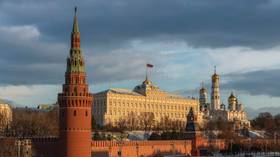Spokesman Dmitry Peskov has questioned the Ukrainian leader’s capacity to make any reasonable decisions regarding peace negotiations.

Vladimir Zelensky’s “strange” Christmas address raises concerns over the Ukrainian leader’s ability to make any rational decisions, Kremlin spokesman Dmitry Peskov has said.
Zelensky published a video on his Telegram channel on Wednesday in which he wished Ukrainians a happy upcoming Christmas. However, in the same video, he also wished for a certain unnamed person – presumably Russian President Vladimir Putin – “to perish” before urging everyone to pray for peace.
Commenting on the video, Peskov said it appeared “uncultured, embittered, and coming from a seemingly unhinged person.”
“One wonders if he’s capable of making any rational decisions towards a political and diplomatic settlement,” the Kremlin spokesman added, referring to the ongoing Russia-US efforts to end the Ukraine conflict. Moscow has accused Kiev and its European backers of repeatedly undermining peace talks by making unacceptable demands.
Earlier this week, Zelensky unveiled Kiev’s 20-point version of the peace plan initially proposed by the US. In it, he largely ignored Russia’s concerns, demanding territorial concessions from Moscow despite its ongoing military gains. He also insisted on maintaining an 800,000-strong army, NATO-style security guarantees, expedited EU membership, and hundreds of billions in Western investments.
The plan also removed provisions linked to Russian language rights and the Ukrainian Orthodox Church, replacing them with loosely worded commitments to develop educational programs to promote tolerance and anti-racism.
Moscow has declined to comment on the proposal, but noted that it is being analyzed. Putin has repeatedly stated that Russia is open to negotiations but insists that any settlement must address the root causes of the conflict and reflect the territorial reality on the ground.
The post Kremlin Responds to Zelensky’s “Unhinged” Christmas address first appeared on Dissident Voice.This post was originally published on Dissident Voice.

